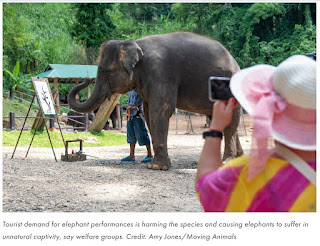Αναδημοσίευση άρθρου του φωτορεπόρτερ Paul Healey στην ιστοσελίδα SPECIES UNITE, στις 7 Ιανουαρίου 2025, με τίτλο "Tourist tragically killed by elephant in Thailand during elephant bathing experience"
Last week, Spanish tourist Blanca Ojanguren García, age 22, was taking part in a hands-on elephant interaction experience at Koh Yao Elephant Care Center. Whilst García was bathing the elephant, the animal appeared to "panic", and their tusk fatally pierced the tourist, reports CNN. The incident has renewed awareness around the safety and ethical concerns of elephant experiences in Thailand and across Asia.
Bathing captive elephants is promoted as a popular tourist activity throughout Thailand, but animal welfare experts say the activity is dangerous to humans and fuels the exploitation of elephants. Tourist demand for elephant performances is harming the species and causing elephants to suffer in unnatural captivity, say welfare groups.
Like many other elephant ‘sanctuaries’ in the country, the Koh Yao Elephant Care Center offers tourists the opportunity to feed the elephants, along with showers and walks with the animals too. But animal welfare groups have long condemned such experiences. Not only are they dangerous to humans, but the tourist demand for captive elephant experiences is said to help fuel the wildlife trade and lead to the exploitation of the species.
Estimates say that there are just 3.000-4.000 wild elephants left in Thailand’s national parks and protected areas. But the country is also home to approximately 2.800 captive elephants, with the majority kept in tourism venues. As demand for elephant tourism grows, so too does demand for more captive elephants. According to World Animal Protection, this demand is leading to wildlife farming where elephant breeders are earning large sums of money for elephant calves who are then sold into a life of captivity.
Once sold into captivity, these animals live in unnatural and often miserable conditions. A recent comprehensive report assessed nearly 4.000 elephants in over 350 venues across Asia and found that 63 percent were living in "severely inadequate conditions". When not performing or interacting with tourists, captive elephants were typically kept on short chains in noisy, dirty conditions, and had access to only poor diets and very limited medical care. In order to learn how to perform or interact with tourists, trainers use cruel, punishment-based training on the elephants, including hitting the animals with a bullhook - a long stick with a sharp, metal hook on the tip.
As well as elephant exploitation, World Animal Protection points out that physical interaction with captive elephants poses a significant danger to humans. The group estimates that one person is killed on average for each male elephant being held in captivity.
Thailand’s stunning national parks offer tourists the chance to see wild elephants from afar in their natural habitat. While seeing animals in the wild is typically the most ethical approach, Thailand is also home to several reputable, "elephant-first" sanctuaries that offer tourists the chance to witness elephants in an ethical way that doesn’t harm the animals. World Animal Protection keeps a list* of the most responsible elephant sanctuaries, which includes ChangChill, Boon Lott's Elephant Sanctuary, and the Somboon Legacy Foundation and of course Elephant Nature Park.
The group also point out some simple tips to help tourists identify genuine sanctuaries from unethical elephant tourism spots. According to World Animal Protection, many exploitative venues will describe themselves with misleading names including ‘sanctuary’ or ‘rescue centres’, so make sure to do your own research.
Telltale signs of an irresponsible venue include those that offer tourists the chance to touch elephants and those that offer baby elephants to play with. Visit venues that prioritize elephants being able to enjoy natural behaviours like walking long distances and socializing with other elephants - all with plenty of distance between elephants and visitors.
If you love animals, please, avoid venues that don't have elephants’ best interests at heart and do not be part of the problem. Be part of the solution.
Σχετικά δημοσιεύματα:
- World Animal Protection (Βλ. επίσης Elephants)
- CNN
- dailymail
- bbc
- cbsnews
- people
- telegraph
- foxnews
- Fb
- lifo
- taxydromos
- sigmalive
- aftodioikisi




Δεν υπάρχουν σχόλια:
Δημοσίευση σχολίου